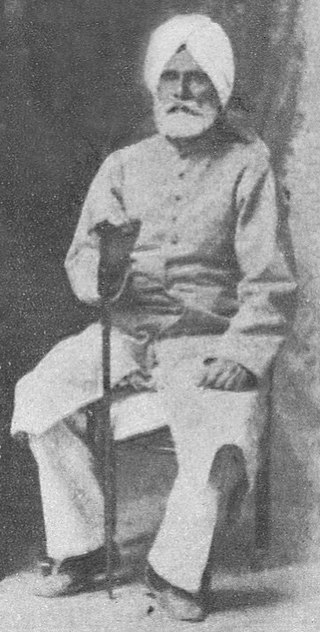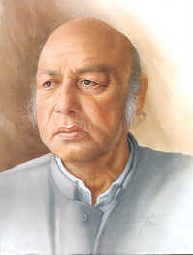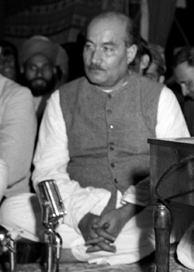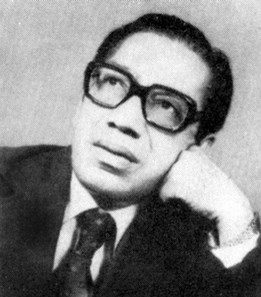Related Research Articles

Faiz Ahmad Faiz was a Pakistani poet and author of Punjabi and Urdu literature. Faiz was one of the most celebrated, popular, and influential Urdu writers of his time, and his works and ideas remain widely influential today in Pakistan and beyond. Outside of literature, he has been described as "a man of wide experience", having worked as a teacher, military officer, journalist, trade unionist, and broadcaster.

Altaf Hussain Hali, also known as Maulana Khawaja Hali, was an Urdu poet and writer.

Salima Hashmi is a Pakistani painter, artist, former college professor, anti-nuclear weapons activist and former caretaker minister in Sethi caretaker ministry. She has served for four years as a professor and the dean of National College of Arts. She is the eldest daughter of the renowned poet Faiz Ahmed Faiz and his British-born wife Alys Faiz.
Mehdi Hassan Khan known as Mehdi Hassan was a Pakistani ghazal singer and playback singer. Widely considered one of the greatest and most influential figures in the history of ghazal singing, Hassan is referred to as the "Shahenshah-e-Ghazal". Known for his "haunting" baritone voice, Hassan is credited with bringing ghazal singing to a worldwide audience. He is unique for his melodic patterns and maintaining integrity of the ragas in an innovative way.
Daud Kamal ) was a Pakistani poet who wrote most of his work in the English language.
The Progressive Writers' Association or the Progressive Writers' Movement of India or Anjuman Tarraqi Pasand Mussanafin-e-Hind or Akhil Bhartiya Pragatishil Lekhak Sangh was a progressive literary movement in pre-partition British India. Some branches of this writers' group existed around the world besides in India, Kashmir and Pakistan
Hasan Abidi was a Pakistani journalist, writer, political activist and an Urdu language poet.
Yasmeen Hameed is a Pakistani Urdu poet, translator and an educator.

Syed Ahmad Shah, better known by his pen name Ahmed Faraz, was a Pakistani Urdu poet, scriptwriter and became the founding Director General of Pakistan Academy of Letters. He wrote his poetry under the pseudonym Faraz. He criticised military rule and coup d'état in the country and was displaced by the military dictators.

Habib Jalib was a Pakistani revolutionary poet, left-wing activist who opposed martial law, authoritarianism and state oppression. Pakistani poet Faiz Ahmed Faiz said that he was the poet of the masses. He opposed military coups and administrators and was duly jailed several times.

Josh Malihabadi popularly known as Shayar-e-Inqalab was one of the finest Urdu poets of the era of British India. Known for his liberal values and challenging the established order, he wrote over 100,000 couplets and more than 1,000 rubaiyat in his lifetime. His wrote Yaadon ki Barat, his autobiography which is noted for its frank and candid style. The first Prime Minister of India, Jawaharlal Nehru held him in high esteem and frequently attended the mushaira at Lala Kishan Lal Kalra's United Coffee House where Josh performed.
Zehra Nigah is a prominent Urdu poet and scriptwriter from Pakistan. She is fondly known as 'Zehra Apa' in the nation. Among the pioneers of poetry by women, Nigah was one of the first Urdu women poets to make their mark in the male dominated field. Nigah's accomplishments especially shone in the domain of mushaira, as she is considered the first female poet to fully participate and make a visible mark in such events. Zehra is an occasional songwriter and scriptwriter too.
Tina Sani is a Pakistani female singer famous for her classical and semi-classical Urdu Ghazals.
Ahmad Rahi was a Punjabi poet and writer from Pakistan.
Hum Dekhenge is a popular Urdu nazm, written by the Pakistani poet Faiz Ahmad Faiz. Originally written as Va Yabqá Vajhu Rabbika , it was included in the seventh poetry book of Faiz -- Mere Dil Mere Musafir.
Naseer Turabi was a Pakistani poet.
Hameed Akhtar, was a newspaper columnist, writer, journalist and the secretary-general of the Progressive Writers Association in Pakistan. He was also the father of TV actresses Saba Hameed, Huma Hameed and Lalarukh Hameed.
Syeda Saiyidain Hameed is an Indian social and women's rights activist, educationist, writer and a former member of the Planning Commission of India. She chaired the Steering Committee of the Commission on Health which reviewed the National Health Policy of 2002, till the dissolution of the body in 2015, to be replaced by NITI Aayog.

Ahmad Shah, known by his pen name as Farigh Bukhari, was a Pakistani multilingual poet and progressive writer. He wrote books, including poetry on various subjects such as literature, social issues and politics in Hindko, Pashto and predominantly in Urdu language. Some of his publications appears about universal values and humanism.
Amna Mawaz Khan is a Pakistani classical dancer of Bharatnatyam, theatre artist, feminist and political worker. She is founding member of Women Democratic Front.
References
- ↑ Hameed, Syeda (5 August 2017). "Faiz Ahmed Faiz: The Colours of my Heart; trs Baran Farooqi reviewed by Syeda Hameed". The Hindu. Retrieved 18 May 2020.
- ↑ Sanyal, Jhuma (13 December 2019). "A journal from the Partition of India". Telegraph India. Retrieved 18 May 2020.
- ↑ "Faiz Ahmed Faiz: A true South Asian". Frontline. 22 February 2020. Retrieved 19 May 2020.
- ↑ Amin-Khan, Tariq (12 March 2012). The Post-Colonial State in the Era of Capitalist Globalization: Historical, Political and Theoretical Approaches to State Formation. Routledge. ISBN 9781136461743 – via Google Books.
- ↑ Haq, Syed Nomanul (9 February 2014). "COLUMN: On the romance of the metaphorical with the real". DAWN.COM.
- ↑ Jamaluddin, Syed (18 July 2008). Formation of Republic of Jinnahpur: An Inevitable Solution. iUniverse. ISBN 9780595514533 – via Google Books.
- ↑ "Faiz Ahmad Faiz: The Poet and journalist". National Herald.
- 1 2 3 Hashmi, Ali Madeeh. "How Faiz Ahmed Faiz's most famous poem came to be written". Scroll.in.
- 1 2 "'Ye Woh Seher Toh Nahi': The Pain of Partition Immortalised in Poetry". News18. 15 August 2019.
- ↑ "'Wo intezaar tha jiska ye wo seher to nahi'". Tribuneindia News Service. 7 March 2019. Retrieved 19 May 2020.
- ↑ "Why Faiz Ahmed Faiz's name is a metaphor for both romance and revolution". InUth. 20 November 2017. Retrieved 19 May 2020.
- ↑ "Faiz daughter sent back. Here's her son on the disturbing deportation of peace icon". www.dailyo.in.
- ↑ Datta, Nonica (23 January 2020). "To reduce Faiz to a single identity is to crush his universal language". The Indian Express. Retrieved 19 May 2020.
- ↑ "Freedom's Dawn (August 1947)". outlookindia.com.
- ↑ "How Faiz Ahmed Faiz's most famous poem came to be written". Kashmir Observer. 1 April 2016. Retrieved 18 May 2020.
- ↑ Ashutosh (5 January 2020). "Neither idols nor God: Faiz worshipped nothing but warmth of humanity". Asiaville. Retrieved 18 May 2020.
Notes
- ↑ The poem was originally written by the poet in Urdu language. It is a literal translation done by not-known writer(s) of the original text, therefore it may not be accurate